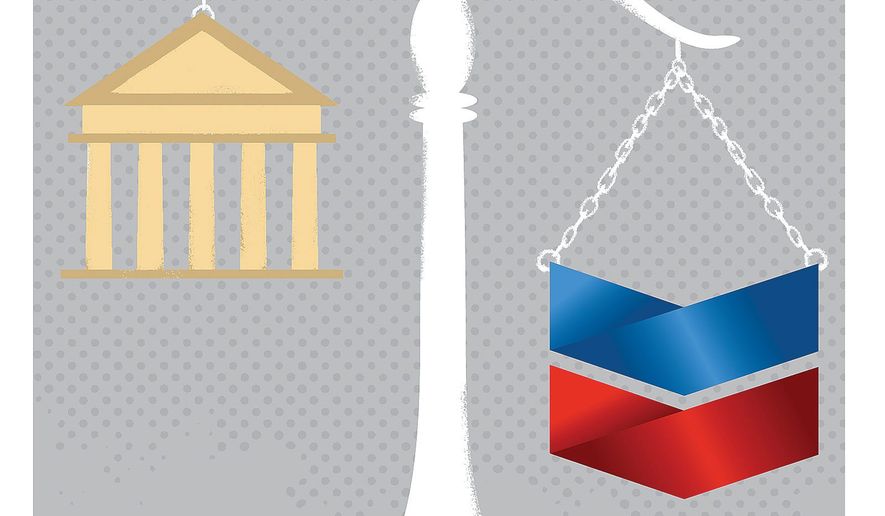OPINION:
Plan on following the fight over President Trump’s nomination to the Supreme Court of D.C. Circuit Court Judge Brett Kavanaugh? If so, then make sure you brush up on so-called Chevron deference. Despite Judge Kavanaugh’s superb qualifications, the Chevron doctrine likely will play a significant role in the bruising battle ahead because of the role it has played in facilitating the expansion of the administrative state.
In its landmark 1984 decision in Chevron USA Inc. v. Natural Resources Defense Council, the Supreme Court held that if a statutory provision is ambiguous, and if a federal agency’s interpretation is a permissible interpretation of the statute, then it is to be given “controlling weight.” Thus, invocation of Chevron deference generally is outcome-determinative in favor of upholding agency regulations.
In recent years, scholars — and, importantly for present purposes, Supreme Court Justices — have expressed skepticism regarding Chevron. Chief Justice John Roberts, and Justices Clarence Thomas and Neil Gorsuch are in the camp of Chevron skeptics. And in a concurring opinion issued in Pereira v. Sessions, shortly before announcing his retirement, Justice Anthony Kennedy announced that he too has joined the Chevron skeptic ranks. Decrying what he called the “reflexive deference” courts often accord agency actions, Justice Kennedy declared that “it seems necessary and appropriate to reconsider, in an appropriate case, the premises that underlie Chevron and how courts have implemented that decision.”
In calling for Chevron’s reconsideration, Justice Kennedy concluded with this fundamental point: “The proper rules for interpreting statutes and determining agency jurisdiction and substantive agency powers should accord with constitutional separation-of-powers principles and the function and province of the Judiciary.” Indeed, a proper understanding of separation of powers in our system of government is at the heart of understanding the basis for the rising Chevron skepticism.
In a key passage in the Chevron opinion — after first determining the Clean Air Act provision at issue was ambiguous — Justice John Paul Stevens wrote: “While agencies are not directly accountable to the people, the Chief Executive is, and it is entirely appropriate for this political branch of the Government to make such policy choices.” According to Justice Stevens, it is proper to “rely on the incumbent administration’s views of wise policy to inform its judgments.”
In one sense, the Court’s political accountability rationale has some appeal as a matter of separation of powers doctrine when a court determines — often too quickly without resort to sound textualist reasoning — that it is confronted with an ambiguous statute. Justice Stevens likely viewed Chevron as a way to fit administrative agencies into the Constitution’s tripartite constitutional regime. Nevertheless, Chevron is certainly in tension with Chief Justice John Marshall’s famous admonition in Marbury v. Madison: “It is emphatically the province and duty of the judicial department to say what the law is.”
When Justice Kennedy in Pereira invoked “the function and province of the Judiciary,” he surely had Marshall’s declaration in mind. And so too has Judge Kavanaugh, Justice Kennedy’s former law clerk, when he has cited Marbury in the context of expressing skepticism regarding Chevron’s reach.
Chevron itself involved a decision of the Environmental Protection Agency, an executive branch agency. With regard to executive branch agencies like EPA, or, say, the Departments of Commerce, Labor, or Transportation, it may be natural, as Justice Stevens did, to refer to the “incumbent administration” and to invoke the chief executive’s direct accountability to the people.
But not so with the so-called independent agencies like the FCC, SEC, FTC, or the NLRB, with their potent brew of combined quasi-executive, quasi-legislative, and quasi-judicial powers. Unlike the single heads of executive branch agencies who may be terminated at will by the president, the independent agencies’ members serve fixed, staggered terms. And the prevailing view is that they may be fired by the president only for good cause.
So, while the independents may have a degree of accountability to the president by virtue of some legislated controls, they are not as politically accountable as the executive branch agencies. This is the reason that a 1937 presidential commission described the independent agencies as a “headless fourth branch” of government, “a haphazard deposit of irresponsible agencies and uncoordinated powers.” The commission added that this “headless fourth branch” is inconsistent with “the basic theory of the American Constitution that there should be three major branches of the Government and only three.”
Because the independent agencies are less politically accountable than the executive branch agencies, I proposed in a 2006 law review article, “Defining Deference Down: Independent Agencies and Chevron Deference,” that their decisions should receive less reflexive judicial deference than those of executive branch agencies. In my view, this makes sense because Chevron itself rests so heavily on the political accountability rationale.
Interestingly, Justice Elena Kagan agrees. In an influential 2001 law review article, “Presidential Administration,” Justice Kagan, then a Harvard Law School professor, stated that the disparity in presidential control should lead to “giving greater deference to executive than to independent agencies.” I don’t know whether Justice Kagan still adheres to this view, or whether Judge Kavanaugh agrees or not.
In any event, regardless how Chevron applies to executive branch agencies, I still believe, as I said in 2006, that “it is odd in a constitutional system with three defined branches for courts to give controlling deference to agencies that, not without reason, are commonly referred to as ’the headless fourth branch.”
Based on Judge Kavanaugh’s jurisprudence, especially his careful scholarly attention to the Constitution’s separation of powers and the proper role of the judiciary, I suspect that he too might agree that Chevron’s application should be reconsidered.
• Randolph May is president of the Free State Foundation.




Please read our comment policy before commenting.